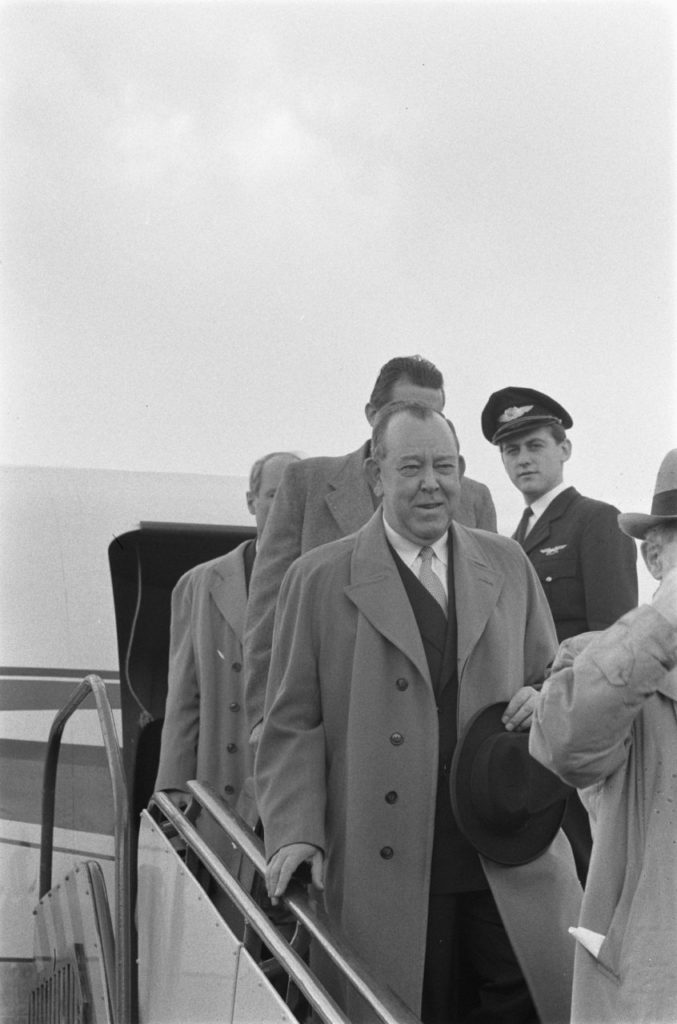First oil company interested

But Endacott was unable to establish whether it was drilling for oil or gas. He was aware that a big gas discovery had been made in the area, and knew from his wartime days that some shallow oil discoveries had been made in eastern England.
He now reasoned that the whole North Sea area must be a big sedimentary basin of substantial geological interest. Once back in Oklahoma, he wanted to put the region on the agenda at Phillips and asked the board whether opportunities for oil exploration in the North Sea had been investigated.[REMOVE]Fotnote: Phillips Historical Project, video interview with Paul Endacott.
This question eventually unleashed hectic activity in the company, with all the oil journals trawled. BP, Esso and Shell were already actively pursuing seismic surveys, so Phillips was far from alone in taking an interest in the southern North Sea.
The company decided that the areas off north-west Germany and the northern Dutch coast were the most interesting in geological terms, followed by waters off Denmark and finally off eastern England.
Phillips decided to acquire further geological information on these regions. Its Paris office under the leadership of Ward W Dunn, deputy head of the international exploration department, was given the principal responsibility for further work and seeking licences from the relevant national authorities.[REMOVE]Fotnote: Brev fra H. D. Brookby til Mr. Paul J. Parker, dated 14. August 1962. Subject: North Sea Basin – England, Netherlands, West Germany and Denmark. Reply Paul Endacott’s August 8, 1962 Memo.
In October, Dunn attended the annual German conference on petroleum research and petrochemicals at Karlsruhe together with Owen Thomas from the Bartlesville head office and Silvio Eha, chief geologist at the Paris office. The geologists discovered there that the sedimentary source rocks for oil and gas in the North Sea very probably extended further north than first assumed.
Once the principles in the Geneva convention on the continental shelf were applied to dividing up these waters into economic zones, Norway and the UK would be left with the biggest shares.
Competition over possible licences would be tough in Germany, and Phillips found Denmark closed to it because the A P Møller group had secured a 50-year sole concession for the whole country – including the continental shelf. In the UK, all the companies would be on an equal footing in the first offshore licensing round.
But Norway had not been contacted by any oil company at that point.[REMOVE]Fotnote: Kvendseth, Stig S, Giant Discovery. A History of Ekofisk Through the First 20 Years, 1988: 10-11.
 første oljeselskap interessert, historie,
første oljeselskap interessert, historie,On the recommendation of the Norwegian embassy in Bonn, Phillips got in touch with Trygve Lie, former secretary general of the UN. Meetings were arranged with him and with Einar Ofstad in the legal department at the foreign ministry. Lie requested a written proposal which could be considered by the financing committee at its meeting on 1 November.
In its letter of 29 October 1962, Phillips wrote:
”We have reasons for believing that the geological basin in which large reserves of natural gas have been discovered in Holland may be extended northward into the Norwegian portion of the North Sea. Therefore, Phillips Petroleum Company is interested in obtaining from the Norwegian Government an oil and gas concession covering the lands laying beneath the territorial waters of Norway plus that portion of the continental shelf lying beneath the North Sea which may now or in the future belong to be under the jurisdiction of Norway. In return for such concession, Phillips would obligate itself to conduct a reconnaissance seismic survey of that area of the North Sea which might come under Norwegian jurisdiction.”
In other words, the company was requesting an exclusive licence for the whole area which could become the Norwegian continental shelf in exchange for conducting seismic surveys worth USD 1 million in these waters.
Lie acknowledged receipt of the letter on 5 November and said it had been forwarded to the Ministry of Industry for further consideration. There the matter rested for the time being.
Norway declares sovereignty over continental shelf